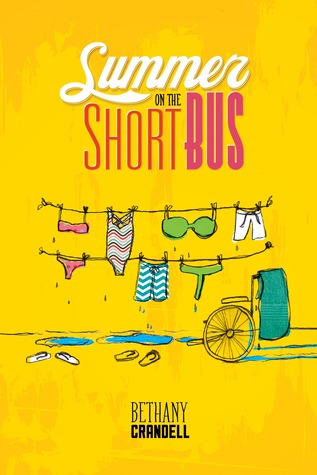I'm lucky (or cunning) enough to have lured yet another successful writer over to my blog for an SAT - Successful Author Talk. SAT authors have conquered the query, slain the synopsis and attained the pinnacle of published. How'd they do it? Let's ask 'em!
Today's guest for the SAT (Successful Author Talk) is Bethany Crandell, author of SUMMER ON
THE SHORT BUS. Bethany wishes she had some mysterious secret to reveal about herself in hopes that you'd find her interesting...but she doesn't. When it comes to Bethany, what you see is what you get. And what you get is an irreverent, sarcastic and emotional girl who writes stories about characters with these same traits.
Are you a Planner or Pantster?
I tell people I’m a Panster because it sounds cool, but the truth is I get very frustrated when I don’t have a least a rough idea where the story is going. Hello, I’m Bethany and I’m a Planner.
How long does it typically take you to write a novel, start to finish?
Every book is different based on my life circumstances at the time. SUMMER ON THE SHORT BUS took about six months, the two novels I wrote after that about nine months. I’ve been chugging away on my current WIP for almost a year and I just hit the ½ way point. *scowls* Can we please talk about something else now? I’m suddenly feeling very unproductive.
Do you work on one project at a time, or are you a multi-tasker?
There’s way too much blonde at work here to do more than one project at a time.
Did you have to overcome any fears that first time you sat down to write?
I didn’t then, but I do now.
When I first started writing, I wasn’t writing for anyone other than myself. It was just balls-to-the-walls, straight-up what I wanted to say without regard for how it would be received. Your perspective can change though, once you know your agent and editor will be reading it. Then you start to second-guess yourself and that’s when you can get scared. I have to squash that fear on a daily basis.
How many trunked books did you have before you were agented?
One, which I am currently reworking.
Have you ever quit on an ms, and how did you know it was time?
Yep. I have two, half-written manuscripts buried somewhere in the depths of my Dropbox folder. I knew it was time to step away when they frustrated me more than inspired me.
Who is your agent and how did you get that "Yes!" out of them?
My road to representation was pretty textbook: Query to slush pile. Slush pile to first ten pages. First ten pages to threatening emails. I’m represented by Rachael Dugas of Talcott Notch Literary Agency.
How many queries did you send?
The exact numbers are fuzzy, but I sent out over 90 query letters, (And probably had about that many revisions to the query itself), and it took roughly eight months.
Any advice to aspiring writers out there on conquering query hell?
Get advice from people who have already been there. I know it’s terrifying to let someone critique your work, but your query is like opening the front door for your prom date. You want to make the best first impression possible. Take your time, revise, get critiques, revise, get more critiques, revise, revise some more, and then go for it.
How did it feel the first time you saw your book for sale?
Like someone was playing an April Fools’ joke on me.
Which, sadly, makes sense given my April 1 release date.
How much input do you have on cover art?
A lot! My publisher was very generous when it came to giving me a voice on the cover.
What's something you learned from the process that surprised you?
How non-glamorous it would be. Don’t get me wrong, it’s beyond exciting, but it’s sort of like when you first learn you’re pregnant. You’re all moony eyed about this baby coming into your world, but soon the reality hits and you realize you have nine, long months of stretch marks, nausea, and swollen boobs ahead of you before you get to hold that little critter. It was really easy to fast forward from the “We sold the book!” moment to the, “Look! There’s my book on the Barnes & Noble shelf!” moment, but the truth is it took hours and hours of work to get to that point. And while you do feel a teeny bit important, successful, glamorous, , more than anything you’re just freaking tired and want to take a nap. Nothing glamorous about that.
How much of your own marketing do you?
Just like every author I know, I do a lot of my own marketing. (Though it NEVER feels like enough) I do have a blog on my website, and also hang out on Twitter and Facebook. Tumblr is where the cool kids go. Sadly, I’m not one of them yet.
When do you build your platform? After an agent? Or should you be working before?
I don’t think there’s a hard and fast rule on this. I think you need to focus on whatever is inspiring you at that time. If the marketing bug is biting you before you have an agent—go for it. As writers, every creative thing we do benefits our work so don’t subscribe to the notion that there’s a certain formula you have to follow to be successful.
Do you think social media helps build your readership?
Definitely. Social media allows you to interact with people you wouldn’t otherwise have an opportunity to know. Even if I wasn’t trying to build my readership I’d be out there getting to know people—it’s fun!



